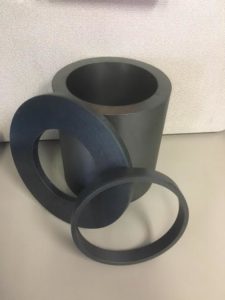
When it comes to high-performance plastics, PEEK and Vespel® are at the top of the list. Both offer an impressive combination of mechanical properties that make them go-to materials for high-heat and high-stress environments. So which polymer is right for your project? In this blog we’ll examine the benefits and differences of Vespel® vs. PEEK to help you choose the right material for your application.
Vespel® vs. PEEK: Shared Benefits
- Superior thermal properties – Both polymers have some of the highest operating temperatures of all thermoplastics and offer outstanding thermal insulation.
- Excellent electrical properties, even at high temperatures.
- Superior creep resistance
- Great machinability – While these polymers have a machinability similar to that of metal, they can be easily processed via CNC machining. They can achieve complex geometries and hold tight tolerances, allowing for the creation of designs that would be impossible with lesser materials.
Vespel® vs. PEEK: Specialized Benefits for Demanding Applications
There are 6 key differences between Vespel® and PEEK:
- While Vespel® is highly resistant to chemical corrosion, PEEK has superior chemical resistance, proving resistant to a broad range of harsh chemicals and acids with very few exceptions (such as hydrofluoric acid and phenol). PEEK’s chemical resistance is close to that of PTFE, but with far greater strength.
- Vespel® has a higher operating temperature. While PEEK can perform continuously at 500ºF, Vespel® can serve at temperatures up to 550ºF and can even endure temperatures up to 900ºF for limited periods.
- PEEK has superior toughness and strength, offering excellent fatigue and stress-crack resistance as well as high strength and stiffness. PEEK is available in a variety of grades, with carbon-filled PEEK among the strongest of all thermoplastics at room temperature.
- Vespel® offers low friction and superior wear performance. While PEEK offers good all-around friction and wear resistance, Vespel® provides a low wear rate and a low, constant CF. Vespel® parts can even run dry if lubrication fails, making them a common choice for bearings and other high-wear applications.
- PEEK offers outstanding biocompatibility, making it a popular choice for medical applications. PEEK’s high strength and modulus is similar to human bone, and it has been used for spinal implants and skull reconstruction.
- Unlike most plastic, Vespel® doesn’t outgas, even at high temperatures. This allows Vespel® parts to operate in a vacuum without contaminating the environment.
Reading Plastic: Your Source for High-Performance Plastic Parts
At Reading Plastic, we have been machining high-quality Vespel® and PEEK parts with tight tolerances for decades. We have the equipment and expertise to provide you with superior plastic parts in a timely manner. For more information about our capabilities or to request a quote, call us today at 610-926-3245.
